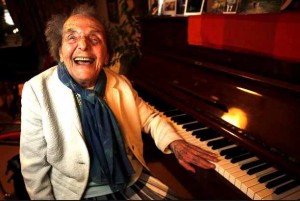Who is a Yogi or Yogini? There are many ways to answer this question, but a key defining characteristics of somebody who is on the path to yoga is the steady reduction of recrimination and regret in life coupled with a steady increase in love and forgiveness. This usually results in a life full of happiness where living is viewed as an extraordinary privilege and a joy. But make no mistake, just by doing an hour of yoga on the mat a few times a week does not necessarily mean that you are on the path of yoga. This may get you started but it may take more effort than that. On the other hand there are lives that have been lived where the person never touched the yoga mat, but nevertheless lived in an entirely yogic manner. The story of Alice Herz-Sommer illustrates. She recently passed away at the age of 110.
Alice Herze was born in Prague, Czechoslovakia on Nov 25 1903. She was one of five children of a German-speaking, secular Jewish family. Her father was a wealthy businessman and her parents mingled with artistic circles. Kafka and Mahler were among the friends of the family.
Alice’s love for music started early. She began her piano lessons at 5. By the time she was in her late teens, she was giving well-received concerts throughout Europe. In 1931 she married a musician-businessman named Leopold Sommer who was also an amateur violinist. The couple had a son, Stepan born in 1937.
By 1939 the situation had deteriorated and Nazi invasion was imminent. Some of her family fled to Palestine. But Alice stayed back to take care of her frail widowed mother. Her husband and child also stayed back. Soon the Nazis came and their worst fears proved true. Jews were first segregated in a Ghetto called Terezin. From here they were deported to forced-labor death camps in batches. About 140,000 Jews passed through Terezin. 90,000 were sent from here to almost certain death to labor camps. Conditions were so bad in Terezin itself that 33,000 died in Terezin itself. By 1942 Alice’s mother was deported to Terezin and from there she was sent to a death camp, where she was killed.
Alice describes the day she escorted her mother to the deportation center in Prague as “The lowest point in my life”. This was also the turning point of her life. She resolved to start practicing Chopin’s Etudes. This work of Chopin, consisting of 27 solo pieces are considered to be the most technically demanding and emotionally charged, offered Alice a way of distraction during difficult times. It eventually turned into something more meaningful. It turned into spiritual sustenance that even saved her life and the life of her son.
By 1942 Alice, her son, and her husband were dispatched to Terezin. Luckily Terezin had an orchestra. Alice played on the camp’s broken out-of-tune piano and joined the orchestra that played more than 100 concerts in Terezin. “These concerts, the people are sitting there- old people, desolated and ill- and they came to the concerts, and this music was for them our food,” she later said. “Through making music, we were kept alive.”
Her husband was deported in 1944 to Auschwitz and Alice never saw him again. He died there of Typhus in 1945, a month before liberation.
Alice and her son were spared of this fate. One night a young Nazi officer stopped her. “Do not be afraid,” he said. “I only want to thank you for your concerts. They have meant much to me.” He then added, “One more thing. You and your little son will not be on any deportation lists. You will stay here until the war ends.”
After the war Alice returned to Prague with her son, but soon emigrated to Israel. Here she taught for many years at the Academy of Music. Then in the 80s she moved to London to be with her son, who was an eminent cellist.
In 2001 her son suddenly died of an aneurysm at age 64. Her neighbors knew that she had weathered the blow when they heard her practicing once more.
By now she had become an iconic figure, a subject of biographies and documentaries. What attracted attention to her was not just her age or the fact that she was the oldest holocaust survivor, or her musical acumen or even her devotion to music, but her sage like lack of regret or recrimination. She one said, “I am looking for the nice things in life. I know about the bad things, but I look only for the good things. The world is wonderful, it’s full of beauty and full of miracles. Our brain, the memory, how does it work? Not to speak of art and music … It is a miracle.”
As advancing age immobilized one finger on each hand, she reworked her technique to play with the remaining fingers, practicing more than 3 hours per day. She continued to swim well past the age of 100 and practiced music till the very end.
On her passing, her Grandson made the following statement. “Much has been written about her, but to those of us who knew her best, she was our dear ‘Gigi’. She loved us, laughed with us, and cherished music with us. She was an inspiration and our world will be significantly poorer without her by our side.”
Her life was not just an inspiration for her immediate family members but to all of us. She showed us how to live a life joyfully inspite of all its troubles. She showed us how a yogini lives her life.
Related:
Alice Herz-Sommer: Everything Is A Present (Short You tube video)
Her Facebook Page
Credits:This has been written by Raj Shah and edited by Ketna Shah.

